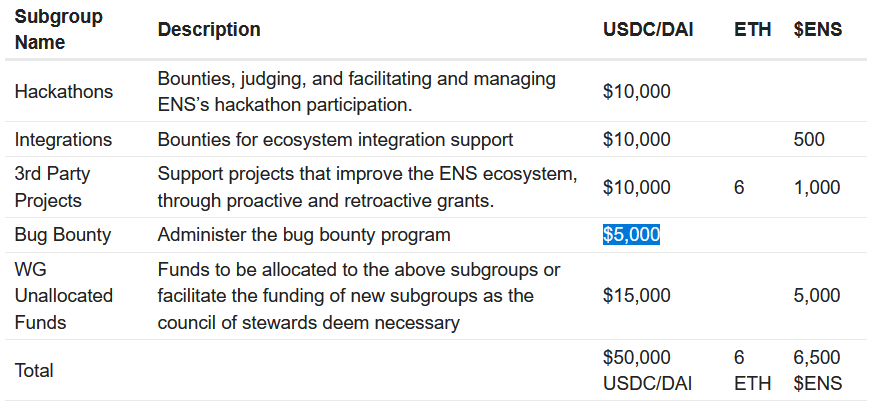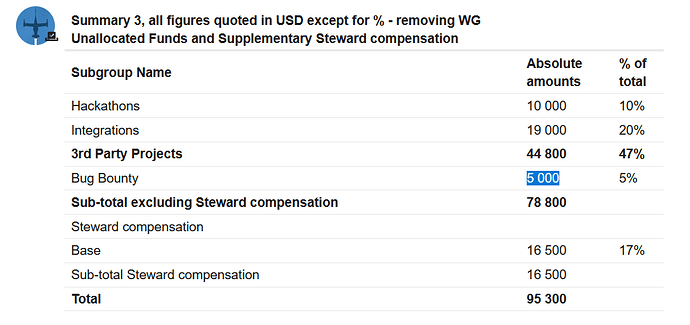Summary
The Ecosystem WG is requesting funding to start the Q1/Q2 2022 term. The initial request is made up of three components:
- Elected steward compensation: $27,500 in USDC/DAI
- Bounties for the Bug Bounty program: $50,000 in USDC/DAI
- Ecosystem WG operational budget: $50,000 in USDC/DAI, 6 ETH, and 6,500 $ENS
After the initial comment period this request will be submitted to a snapshot vote on the 14th of February.
Bug Bounty
The ENS Bounty Program provides bounties for bugs. This program has been running since 2017 and historically has been funded by True Names Limited (TNL). With the creation of the DAO, the DAO is now able to manage and fund the bug bounty. Details of the program can be found here. The $50,000 will be awarded to developers outside of TNL who find vulnerabilities in the ENS protocol. As well as funding for white hat coding in response to system vulnerabilities which arise.
Operational Budget
The operational budget supports ecosystem subgroups with the following allocations:
| Subgroup Name | Description | USDC/DAI | ETH | $ENS |
|---|---|---|---|---|
| Hackathons | Bounties, judging, and facilitating and managing ENS’s hackathon participation. | $10,000 | ||
| Integrations | Bounties for ecosystem integration support | $10,000 | 500 | |
| 3rd Party Projects | Support projects that improve the ENS ecosystem, through proactive and retroactive grants. | $10,000 | 6 | 1,000 |
| Bug Bounty | Administer the bug bounty program | $5,000 | ||
| WG Unallocated Funds | Funds to be allocated to the above subgroups or facilitate the funding of new subgroups as the council of stewards deem necessary | $15,000 | 5,000 | |
| Total | $50,000 USDC/DAI | 6 ETH | 6,500 $ENS |
Elected Steward Compensation
Provide compensation for the stewarding and the coordination efforts of active elected stewards.
| Description | Compensation | Months # | Stewards # | Total |
|---|---|---|---|---|
| Base Compensation | $1,000/month | 5.5 | 3 | $16,500 |
| Supplement compensation* | $2,000/month | 5.5 | N/A | $11,000 |
| Total | $27,500 USDC/DAI |
*Supplement compensation is allocated to the steward who supports coordination or who has greater involvement in DAO activities above what is expected of a steward. The steward council determines how the supplemental compensation is split between the stewards based on contributions of each steward.
It should be noted that the ecosystem working group has three elected stewards (@slobo.eth, @Ginge.eth, @bobjiang) and two appointed stewards (@nick.eth, @jefflau.eth). The appointed stewards are not compensated via this request.
Edit, adding polls
- Support
- Oppose (provide explanation in replies)
0 voters
- Support
- Oppose (provide explanation in replies)
0 voters
- Support
- Oppose (provide explanation in replies)
0 voters
edit: updated bug bounty link

